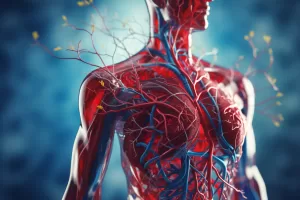High blood pressure may occur without a specific cause and then it is known as primary hypertension. Another situation happens when some other initial disease provokes this condition. Thus, hypertension serves as a symptom and cannot be treated properly without diagnostics of the cause. Let’s find out what are the Secondary Causes of Hypertension.
In order not to get lost among all the possible causes and conditions, we have subdivided them into more and less common ones. Discover the explanations together with diagnostics and treatment techniques.
Most Common Causes of Secondary Hypertension
Blood pressure measurement consists of the systolic value (pressure during a heartbeat) and the diastolic value (pressure between beats). They are always listed jointly and the normal numbers are near 120/80. Still, they vary according to age, weight and overall health condition.
A healthcare provider recommends monitoring blood pressure, if it often goes too high, when there is a family history of this disease and other risk factors, such as obesity, diabetes, stress, etc.
If primary hypertension does not have an additional causes, a secondary one usually occurs due to kidney diseases, endocrine issues, coarctation of the aorta, sleep apnea and because of the intake of certain medicines.
Renal Causes
Kidneys represent an important part of the blood pressure control system. They regulate the amount of water in the vessels and produce several substances required for balancing inner pressure. That is why all diseases related to these organs result in some pressure disturbance.
Chronic kidney disease
In the case of chronic kidney disease, these organs just cannot work properly. Thus, the water is retained in the body and this gradually leads to higher blood pressure. In addition, patients experience swelling, especially in the face.
Renal artery stenosis
This disease means stenosis (narrowing) of the arteries that supply blood to the kidneys. This can happen through the same mechanism as atherosclerosis when fat accumulates inside the blood vessels or the muscle and fibrous tissues of the latter can lose their elasticity. In any case, the narrowing of the arteries leads to the creation of additional pressure to move the blood through them.
Polycystic kidney disease
This condition is inherited and is accompanied by the formation of cysts in the kidneys. They disturb the normal functioning of the organs, and as a result, blood pressure rises.
Endocrine Causes
The hormonal system also participates in blood pressure regulation. The body has a full set of compounds that control and regulate its value. Thus, changes in their concentrations immediately influence it.
Primary aldosteronism (Conn’s syndrome)
Aldosterone is also known as the salt-retaining hormone and is produced by the kidneys to regulate water-salt balance and pressure. When the body produces too much of it due to Conn’s syndrome, secondary hypertension occurs.
Cushing’s syndrome
Another crucial hormone is cortisol. It regulates the metabolism of carbohydrates and blood pressure and is produced in large quantities as a response to danger or stress. In such a situation, the body needs activation, higher glucose level and pressure to fight or run. However, certain diseases like Cushing’s syndrome disturb this system and make the body to overproduce cortisol without a real need.
Hyperthyroidism
The thyroid gland takes part in the regulation of all metabolic processes. When it produces too many hormones this results in abrupt changes in blood pressure.
Hypothyroidism
However, if there are not enough thyroid hormones, this can also result in secondary hypertension due to the increase in weight and retention of water and salt in the body.
Medication-induced Hypertension
Not only inner but also some outer causes of high blood pressure are known. Certain medicines disturb this sophisticated balance inside the body and lead to secondary hypertension as a side effect.
Oral contraceptives
These pills have a variety of side effects and high blood pressure is one of them. Scientists are still working on the explanation but oral contraceptives are rarely prescribed to women with hypertension and others should control their pressure during their intake.
Nonsteroidal anti-inflammatory drugs (NSAIDs)
In addition to reducing inflammation and pain, these medicines also influence the work of the kidneys. Namely, they reduce blood flow in them and increase the retention of sodium. A combination of these two effects leads to higher blood pressure levels after their intake.
Decongestants
The main idea of decongestants is to shrink blood vessels in the nose and reduce swelling. This helps to open up a nose and return to normal breathing. However, the effect is not only local, so patients with hypertension should be always careful with them and other patients should be aware of such side effects as high blood pressure.
Coarctation of the Aorta
Another reason for pressure changing is the tightening of the aorta. This artery is located on the left side of the heart and is highly important for proper blood supply. Coarctation hinders blood flow and the system tries to compensate for this effect through higher pressure.
Sleep Apnea
Due to the problems with the upper airways, the breathing may abruptly stop at night and then continue to flow. A person may be awakened or not but the blood pressure will try to compensate for this situation and rise.
Uncommon Causes Secondary of Hypertension
In addition to the all conditions listed above, some rare causes should be also taken into account.
Pregnancy-induced Hypertension
Due to numerous changes in the body of a pregnant woman, it may respond with dangerously high blood pressure.
Gestational hypertension
If hypertension occurs after 20 weeks of pregnancy in women who didn’t have such issues before, it is called gestational. This condition is rarely accompanied by severe symptoms and is considered not dangerous.
Preeclampsia
Preeclampsia is similar to the previous case but too high blood pressure is accompanied by bad headaches, swelling, nausea and vomiting. Thus, this condition requires diagnostics and proper treatment in the hospital.
Thyroid Disorders
When changes in thyroid hormone concentration lead to high blood pressure, it is highly important to figure out their real cause. The latter can be multiple and require special treatment.
Thyroid nodules
Nodules can form in the thyroid gland and hinder its normal functioning. One of the results and symptoms of this condition may be high blood pressure.
Thyroid cancer
All types of thyroid cancer influence the production of hormones by the gland. Subsequently, their decrease or increase results in hypertension as a symptom.
Neurological Causes
A specific case of secondary hypertension is high intracranial pressure. This may happen due to different reasons that must be diagnosed and treated quickly.
Intracranial tumors
A tumor that is located in the brain area influences the pressure and, at first, causes intracranial hypertension. If left untreated, it may influence the whole body.
Intracranial pressure
Not only tumor growth leads to this condition, but it may also have other causes, such as a head injury, stroke, ruptured aneurysm, brain abscess, meningitis or encephalitis. All these conditions are life-threatening and must be diagnosed as soon as possible. Thus, patients with high intracranial pressure must get immediate professional help.
Stimulant Drugs Abuse
The most well-known stimulants are amphetamine, methamphetamine and methylphenidate. The main goal of their action is to activate the whole body and give it an upsurge of energy. This effect is also associated with making the blood pressure higher.
People who abuse such drugs disturb the inner control of the blood pressure and the system cannot get back to the norm. This may lead to higher levels even when the intake of the drug was stopped.
Diagnosis and Screening of Secondary Hypertension
During the diagnostics process, a healthcare provider has to gather family history and as much information as possible about the patient to find out the real cause of hypertension.
Physical examination and vital signs
Additional symptoms are highly important. Thus, the presence of some primary diseases may be diagnosed by:
- resent changes in body weight;
- swelling in different body parts;
- intense hair growth;
- skin rash or some strange marks;
- disturbance in kidneys’ function.
Blood and urine tests
The two most common tests include:
- Urea examination for creatinine and urea reveals the condition of the kidneys;
- Blood calcium and potassium levels help to identify the condition of the cardiovascular and hormonal systems.
Imaging studies (e.g., renal ultrasound, MRI)
Kidneys are the most accurately studied organs. For this, a doctor prescribes an ultrasound that reveals their size and blood flow. The latter can be also checked by an arteriogram.
To check the condition of the adrenal glands, a contrast tomography scan or magnetic resonance imaging is made.
Hormonal tests
Thyroid tests are also prescribed to check the hormone levels in the blood and evaluate the work of this small but important gland.
Treatment and Management
As high blood pressure belongs to dangerous health conditions, it must be treated immediately. Even while the doctor is searching for the primary cause, he will at once prescribe some medicines to reduce its value and try to bring it back to normal. Moreover, the body’s response to therapy often gives valuable information for diagnostics.
Antihypertensive drugs
There is a huge variety of antihypertensive drugs. They differ in the mechanism of action and may influence kidneys, blood vessels, or both of these systems. Therefore, the prescription must be done by the specialist who will choose not only the medicine but also its dosage.
The task of the patient is to strictly follow the recommendations and control the body’s response, i.e. the blood pressure level.
You might find this helpful: Lisinopril use to treat cardiovascular issues.
Specific medications for certain causes
If the pressure is too high and the situation is life-threatening, there are certain medicines like strong diuretics that decrease it swiftly. They must be taken only under the doctor’s control.
Lifestyle modifications
All patients with hypertension should take care of their lifestyle and switch to a healthier version, namely:
- eat a healthy diet with low sodium levels;
- maintaining a healthy body weight;
- exercise regularly;
- avoid smoking and drinking alcohol.
Summary
In a nutshell, the blood pressure must be stable and controlled. If its value is disturbed and often goes too high, one should at once visit the doctor, find out the cause of this problem and follow treatment recommendations. Moreover, if it happens to be a symptom of another disease, it’s better to diagnose it in time and help the body to cope with it.
FAQ
What is the most common secondary hypertension?
The most widespread causes for this condition include kidney and endocrine issues, coarctation of the aorta and sleep apnea.
What are the primary and secondary causes of hypertension?
Primary hypertension occurs without a special cause, while a secondary one may have different reasons starting from kidney failure and ending with certain cancer types.
Can high blood pressure be a symptom of something else?
Yes, it is called secondary hypertension and has lots of possible causes, such as kidney failure, hormonal disturbance, sleep apnea, misuse of medicines, coarctation of the aorta, etc.


